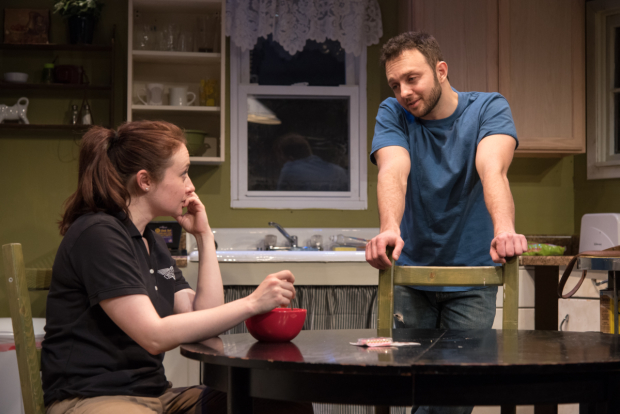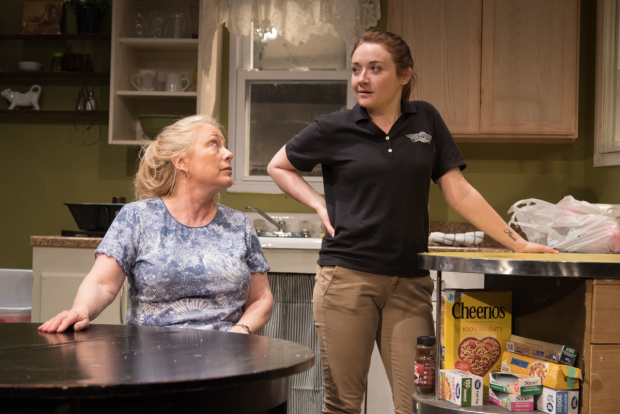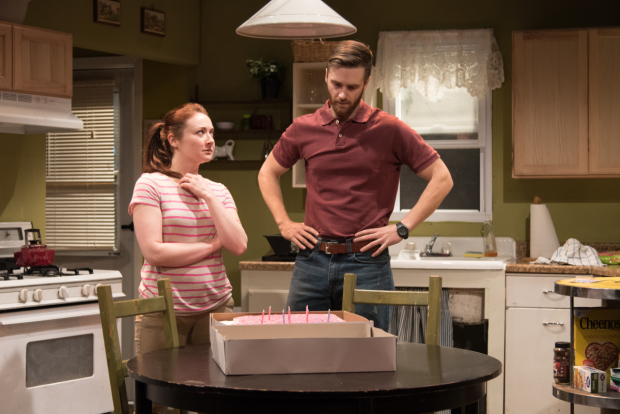Utility
Emily Schwend pens a new play about the blurry line between useful and useless relationships.

(© Russ Rowland)
Are the Amoralists growing up? With plays like the provocative The Pied Pipers of the Lower East Side, the company has carved out a reputation as the naughty children of off-off-Broadway. So it is surprising that their latest play, Emily Schwend's Utility, is a far more sedate affair. Following the tribulations of one American family, it never veers into caricature (like the admittedly hilarious Rantoul and Die). Rather, it offers a soberly ambivalent assessment of the sacrifices people make not just to get ahead, but to just maintain a life they didn't want in the first place.
Amber (Vanessa Vache) is a habitually exhausted mother of three living in East Texas. She works two jobs in order to give her kids something that resembles a middle-class childhood. It's not easy: With her mother, Laura (the hilarious Melissa Hurst), second-guessing her every move and her modest home crumbling around her, Amber paddles furiously just to keep her head above water. Her estranged husband, Chris (James Kautz), is living with his brother, Jim (Alex Grubbs), and wants to move back home. The addition of a second income from Chris might just help take the pressure off — provided he doesn't fall into his old habit of taking pills and sleeping around. As Amber prepares for her daughter's birthday party, the electricity shuts off (the bill was Chris' responsibility). In the suffocating Texas heat, they struggle to save the groceries from the melting refrigerator, frantically improvising in order to survive in an economy seemingly designed to humiliate them.

(© Russ Rowland)
Like her ghostly The Other Thing (in which Kautz also appeared), Schwend's Utility meanders, with scenes sagging through extended discussions of old times and absent characters. Sometimes the actors sit in silence, smoking a cigarette or sipping sweet tea. A scene featuring Laura and Amber wrapping birthday presents at the kitchen table feels interminable. It seems to be designed to show the thousand ways mother undercuts daughter, but Hurst and Vache are such great actors that we get the point in the first minute, rendering much of the passage superfluous.
Luckily, the actors are able to hold our attention. Vache leads this typically stellar cast of Amoralists with a palpable tension. Through shallow breaths and a masklike scowl, she conveys the story of a young mother about to drown. "I gotta lose just about everything I used to like about myself just so I can keep sh*t even halfway decent for everyone else around here," she laments. Having been burned too many times, she views Chris as just "another mouth to feed."
But what an adorable mouth it is! Kautz amps up the charm as Chris, shooting Amber an irresistible smile whenever she begins to despair. Sure, he forgot to pay the electric bill, but he's working hard to fix up the house and make extra money by picking up bartending shifts. Between her fretful thoroughness and his implacable optimism, one gets the sense that they could actually make a pretty good pair, given the proper specialization of tasks and some decently pay.
As played by Grubbs, Jim is a far more inscrutable figure. He hides his true feelings behind a stony expression, near-mumbled diction, and a voice modulated to an unnaturally low level (the result of a lifetime of affecting masculinity in the American South). He attempts to scale this emotional barrier late in the play with an extended monologue about the first time he and Amber took a smoke break together, a seemingly insignificant moment that obviously bears a lot of meaning for him. Grubbs amazingly makes it through all 600-some words without ever surrendering any of Jim's stoic mystery.

(© Russ Rowland)
Under the direction of Jay Stull, Utility quietly simmers with potential (though it never quite reaches a boiling point). Sound designer Jeanne Travis underscores the first part of the play with the constant whir of electric appliances. Once the power shuts off, the silence becomes truly eerie. For a jaundiced kitchen, Kate Noll's set brims with intrigue and sadness. A cheap and weathered American flag (probably made in China) hangs from the aluminum siding. Lighting designer Nicholas Houfek effectively creates a blackout without overdoing it to the point that the actors are indiscernible. Taken together, Utility sometimes feels like the exposition scenes of a horror film, one in which the killer never shows up to work.
Then again, the scenario Schwend envisions (the inability to rustle up $25 for electricity) is horrifying enough. Even scarier is the fact that for millions of American families, the events and circumstances of this play are desperately real. Shaggy dialogue and dead-end exposition aside, Utility is a vitally honest story of perseverance in the face of the massive challenges facing working-class American families.











